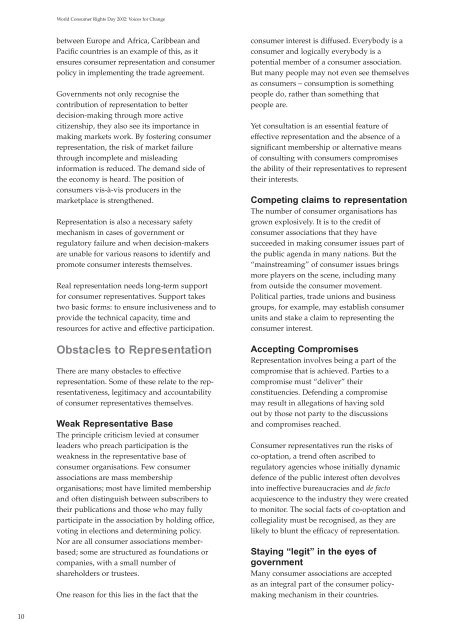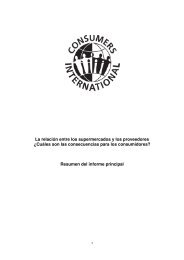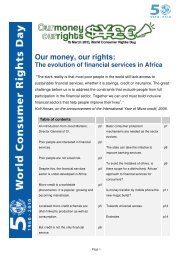Voices for Change: the Consumer Right to Representation
Voices for Change: the Consumer Right to Representation
Voices for Change: the Consumer Right to Representation
You also want an ePaper? Increase the reach of your titles
YUMPU automatically turns print PDFs into web optimized ePapers that Google loves.
10<br />
World <strong>Consumer</strong> <strong>Right</strong>s Day 2002: <strong>Voices</strong> <strong>for</strong> <strong>Change</strong><br />
between Europe and Africa, Caribbean and<br />
Pacific countries is an example of this, as it<br />
ensures consumer representation and consumer<br />
policy in implementing <strong>the</strong> trade agreement.<br />
Governments not only recognise <strong>the</strong><br />
contribution of representation <strong>to</strong> better<br />
decision-making through more active<br />
citizenship, <strong>the</strong>y also see its importance in<br />
making markets work. By fostering consumer<br />
representation, <strong>the</strong> risk of market failure<br />
through incomplete and misleading<br />
in<strong>for</strong>mation is reduced. The demand side of<br />
<strong>the</strong> economy is heard. The position of<br />
consumers vis-à-vis producers in <strong>the</strong><br />
marketplace is streng<strong>the</strong>ned.<br />
<strong>Representation</strong> is also a necessary safety<br />
mechanism in cases of government or<br />
regula<strong>to</strong>ry failure and when decision-makers<br />
are unable <strong>for</strong> various reasons <strong>to</strong> identify and<br />
promote consumer interests <strong>the</strong>mselves.<br />
Real representation needs long-term support<br />
<strong>for</strong> consumer representatives. Support takes<br />
two basic <strong>for</strong>ms: <strong>to</strong> ensure inclusiveness and <strong>to</strong><br />
provide <strong>the</strong> technical capacity, time and<br />
resources <strong>for</strong> active and effective participation.<br />
Obstacles <strong>to</strong> <strong>Representation</strong><br />
There are many obstacles <strong>to</strong> effective<br />
representation. Some of <strong>the</strong>se relate <strong>to</strong> <strong>the</strong> representativeness,<br />
legitimacy and accountability<br />
of consumer representatives <strong>the</strong>mselves.<br />
Weak Representative Base<br />
The principle criticism levied at consumer<br />
leaders who preach participation is <strong>the</strong><br />
weakness in <strong>the</strong> representative base of<br />
consumer organisations. Few consumer<br />
associations are mass membership<br />
organisations; most have limited membership<br />
and often distinguish between subscribers <strong>to</strong><br />
<strong>the</strong>ir publications and those who may fully<br />
participate in <strong>the</strong> association by holding office,<br />
voting in elections and determining policy.<br />
Nor are all consumer associations memberbased;<br />
some are structured as foundations or<br />
companies, with a small number of<br />
shareholders or trustees.<br />
One reason <strong>for</strong> this lies in <strong>the</strong> fact that <strong>the</strong><br />
consumer interest is diffused. Everybody is a<br />
consumer and logically everybody is a<br />
potential member of a consumer association.<br />
But many people may not even see <strong>the</strong>mselves<br />
as consumers – consumption is something<br />
people do, ra<strong>the</strong>r than something that<br />
people are.<br />
Yet consultation is an essential feature of<br />
effective representation and <strong>the</strong> absence of a<br />
significant membership or alternative means<br />
of consulting with consumers compromises<br />
<strong>the</strong> ability of <strong>the</strong>ir representatives <strong>to</strong> represent<br />
<strong>the</strong>ir interests.<br />
Competing claims <strong>to</strong> representation<br />
The number of consumer organisations has<br />
grown explosively. It is <strong>to</strong> <strong>the</strong> credit of<br />
consumer associations that <strong>the</strong>y have<br />
succeeded in making consumer issues part of<br />
<strong>the</strong> public agenda in many nations. But <strong>the</strong><br />
“mainstreaming” of consumer issues brings<br />
more players on <strong>the</strong> scene, including many<br />
from outside <strong>the</strong> consumer movement.<br />
Political parties, trade unions and business<br />
groups, <strong>for</strong> example, may establish consumer<br />
units and stake a claim <strong>to</strong> representing <strong>the</strong><br />
consumer interest.<br />
Accepting Compromises<br />
<strong>Representation</strong> involves being a part of <strong>the</strong><br />
compromise that is achieved. Parties <strong>to</strong> a<br />
compromise must “deliver” <strong>the</strong>ir<br />
constituencies. Defending a compromise<br />
may result in allegations of having sold<br />
out by those not party <strong>to</strong> <strong>the</strong> discussions<br />
and compromises reached.<br />
<strong>Consumer</strong> representatives run <strong>the</strong> risks of<br />
co-optation, a trend often ascribed <strong>to</strong><br />
regula<strong>to</strong>ry agencies whose initially dynamic<br />
defence of <strong>the</strong> public interest often devolves<br />
in<strong>to</strong> ineffective bureaucracies and de fac<strong>to</strong><br />
acquiescence <strong>to</strong> <strong>the</strong> industry <strong>the</strong>y were created<br />
<strong>to</strong> moni<strong>to</strong>r. The social facts of co-optation and<br />
collegiality must be recognised, as <strong>the</strong>y are<br />
likely <strong>to</strong> blunt <strong>the</strong> efficacy of representation.<br />
Staying “legit” in <strong>the</strong> eyes of<br />
government<br />
Many consumer associations are accepted<br />
as an integral part of <strong>the</strong> consumer policymaking<br />
mechanism in <strong>the</strong>ir countries.






![pkef]Qmf eg]sf] s] xf] < - Consumers International](https://img.yumpu.com/6479658/1/184x260/pkefqmf-egsf-s-xf-consumers-international.jpg?quality=85)
